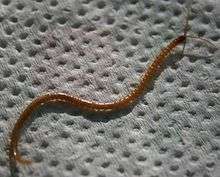Geophilus flavus
| Geophilus flavus | |
|---|---|
 | |
| Scientific classification | |
| Kingdom: | Animalia |
| Phylum: | Arthropoda |
| Subphylum: | Myriapoda |
| Class: | Chilopoda |
| Order: | Geophilomorpha |
| Family: | Geophilidae |
| Genus: | Geophilus |
| Species: | G. flavus |
| Binomial name | |
| Geophilus flavus (De Geer, 1778)[1] | |
| Synonyms | |
| |
Geophilus flavus is a species of centipede in the family Geophilidae.[2] The Geophilidae (like other members of Geophilomorpha) are called soil centipedes. It is terrestrial and commonly found at seashore locations.[1]
Description
Specimens are yellow in colour, have 49–57 pairs of legs, and may grow up to 45 millimetres (1.8 in) in length.[3][2]
Diet
These centipedes feed on other invertebrates in their environment, including other arthropods and earthworms.
Reproduction
The females lay clutches of 50-60 eggs in soil or rotten wood. They stand guard over the eggs until the offspring is born. The females sometimes lick the eggs to protect them from fungi. [4]
Distribution
This species is found across Europe, and has been introduced into North America and Australia.[2]
References
- 1 2 A. D. Barber (2012). A. D. Barber, eds. "Geophilus flavus (De Geer, 1778)". World database of littoral Myriapoda. World Register of Marine Species. Retrieved May 11, 2012.
- 1 2 3 "Tasmanian Multipedes: Geophilomorpha". Polydesmida.info. Retrieved 2012-05-09.
- ↑ "Macro Photos - Chilopoda (centipedes) - Geophilus flavus". Insectmacros.com. Retrieved 2012-05-09.
- ↑ http://groups.yahoo.com/neo/groups/MesozoicLife/conversations/topics/1215
External links
This article is issued from Wikipedia - version of the 1/4/2016. The text is available under the Creative Commons Attribution/Share Alike but additional terms may apply for the media files.